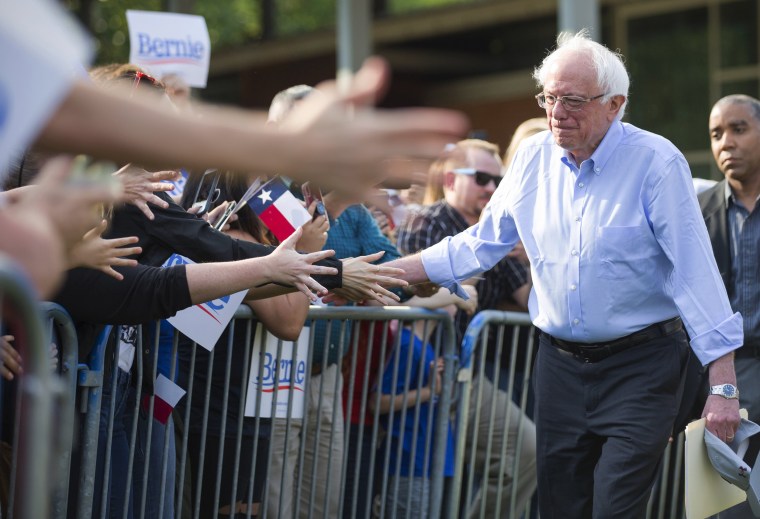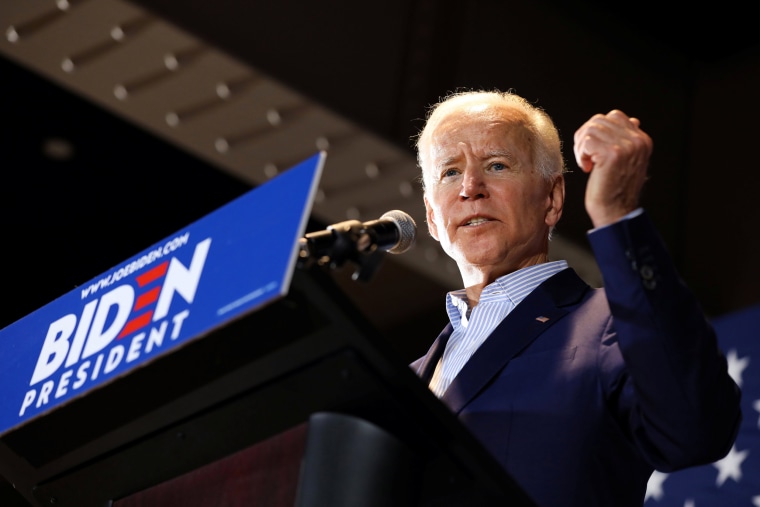WASHINGTON — Joe Biden's having a moment unlike any other in his three bids for the presidency.
The former vice president posted the biggest first-day fundraising total of any of the many contenders for the Democratic nomination. Then, he vaulted into a commanding lead in national polls. And, at least for the time being, the knocks against his record — from his vote for the Iraq War to his handling of Supreme Court Justice Clarence Thomas' confirmation hearings — appear to be bouncing off him like video-game defenders.
Right now, he's in a class by himself.
Biden's feeling emboldened enough that he said Tuesday the House has "no alternative" but to pursue the impeachment of President Donald Trump if he blocks a congressional follow-up to special counsel Robert Mueller's Russia and obstruction of justice investigation.
The impeachment talk — pleasing to the Democratic base — may follow logically from Biden making the case in his launch video last week that Trump is threatening the institutions of American democracy. But it also represents a bold step for a figure deeply embedded in the political establishment that could help him obscure the policy and tactical differences he has with the energized progressive wing of his party.
It's a shock-and-awe campaign that has been countered so far only by Sen. Bernie Sanders, I-Vt., drawing a line in the sand on policy.
It won't be clear for some time whether Biden can turn the fast start into an explosive dash to the nomination, but Democrats say they're not surprised he got out of the blocks with a burst.
The difficulty of "running against a two-term vice president who also had a national profile as a senator should not be underestimated," said a top aide to one of Biden's opponents. "If (any challengers) did, that would be foolish."
The early returns are more promising than Biden had any right to expect.
Three national polls on Tuesday pegged him with a comfortable lead — 36 percent to 39 percent, with Sanders, the runner-up for the Democratic nomination in 2016, claiming the second-best spot at 22 percent in one of the surveys.
In another poll, Sanders was second at 15 percent, and, in the third, Sen. Elizabeth Warren of Massachusetts was second at 12 percent.
Biden, who ran for president in 1988 and 2008, is more accustomed to seeing his name next to a low single-digit polling figure.
It is Sanders who has the most incentive to tackle the Biden threat directly: There's no one else clearly in front of him, and he has little time to waste in drawing contrasts with Biden on policies that matter to many core Democratic voters.
"I think when people take a look at my record versus Vice President Biden's record, I helped lead the fight against NAFTA. He voted for NAFTA. I helped lead the fight against (normal trade relations) with China. He voted for it," Sanders said in a CNN interview. "I strongly opposed the Trans-Pacific Partnership. He supported it. I voted against the war in Iraq. He voted for it."
Sanders' message seems to be that Biden often gets the big stuff wrong.

One key question is whether that will matter to the majority or a large plurality of Democratic voters if they think Biden is the candidate best-equipped to take on Trump in a general election. Another is whether Biden can convince them that he is, in fact, that candidate.
Biden defended himself during a trip to Iowa Tuesday but declined to swing back at Sanders.
"We got plenty of time to respond. I’m not going to get in a debate with my colleagues here,” he said. “I’m proud of my record.”
It's early in a long race, but other than Sanders, Democratic hopefuls have been reluctant to take shots at Biden so far, a reflection, party insiders say, of fear that voters won't take well to vitriol aimed at anyone other than Trump.
For example, when Sen. Kamala Harris of California was asked about Biden's candidacy by NBC News' Vaughn Hillyard on Tuesday, she contrasted herself with her 76-year-old rival in such subtle terms that they would hardly qualify as an attack.
"I would urge that you listen closely to what the candidates have to say and make your decision based on who you believe can best represent our country and the future of our country," she said.
The change-agent angle is one that Sanders' team is eager to focus attention on because Biden has presented himself more as a return to the Obama era than as someone who would radically alter the existing system.
Rep. Ro Khanna, D-Calif., a co-chairman of Sanders' campaign, said in an interview that, like many Democratic voters, he has a favorable opinion of Biden. But, he added, "nostalgia" for Biden's service in the Obama administration — a look to the past — is the wrong direction for Democrats to aim if they want to defeat Trump.
"The worst mistake we could make is to allow Trump, as an incumbent president, to be the change agent," Khanna said, adding that he thought the nomination would come down to Biden and Sanders "because of this sense of nostalgia folks have for the way things were."
"I just don’t think that’s ultimately what will beat Donald Trump," he said.
For now, though, what Biden is looking back at is a full field of Democratic candidates behind him.

